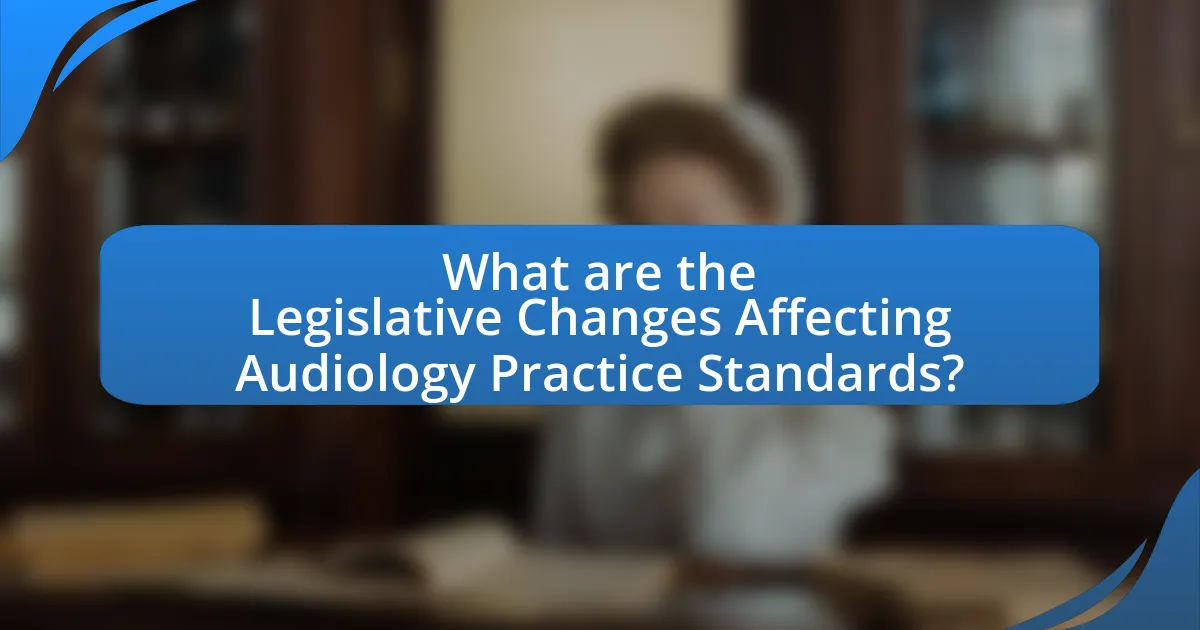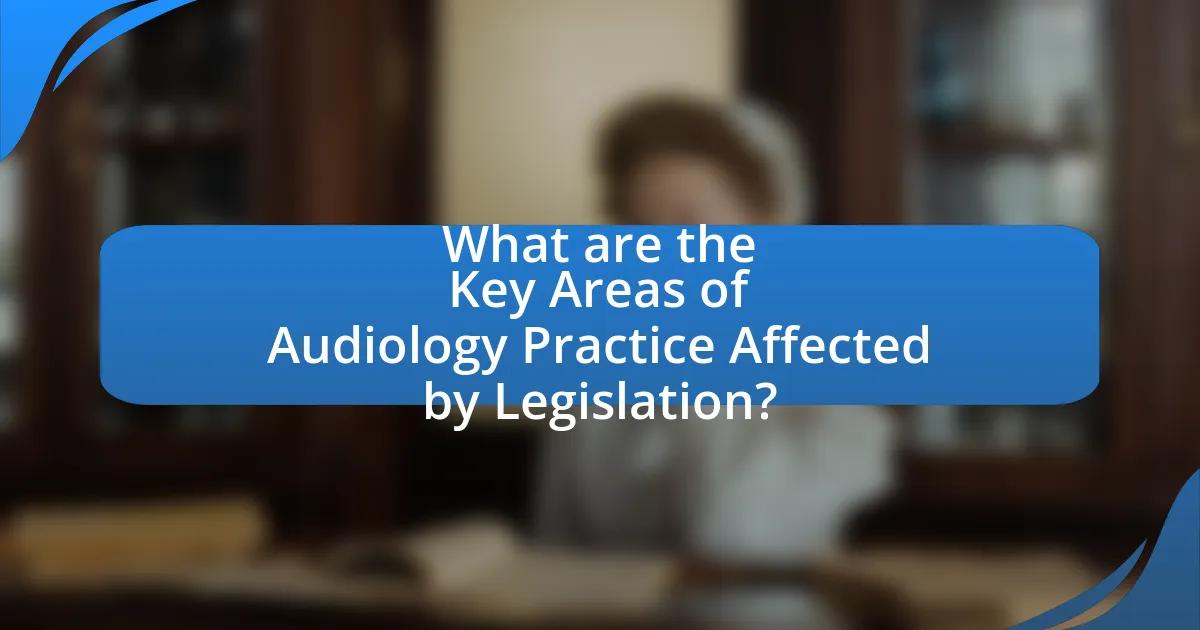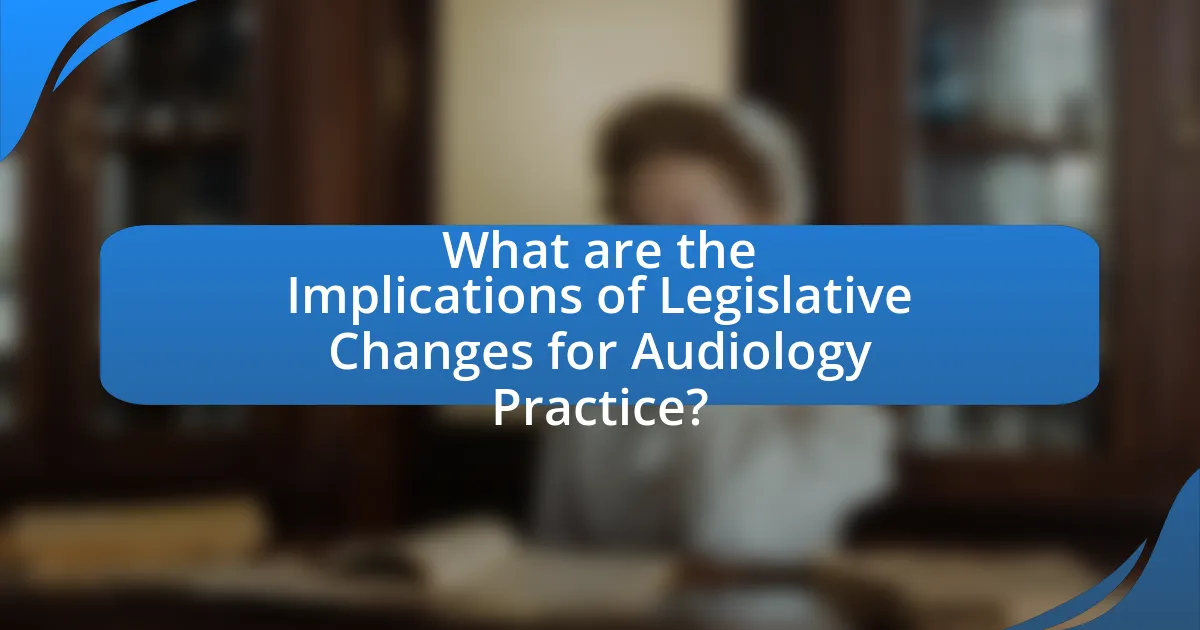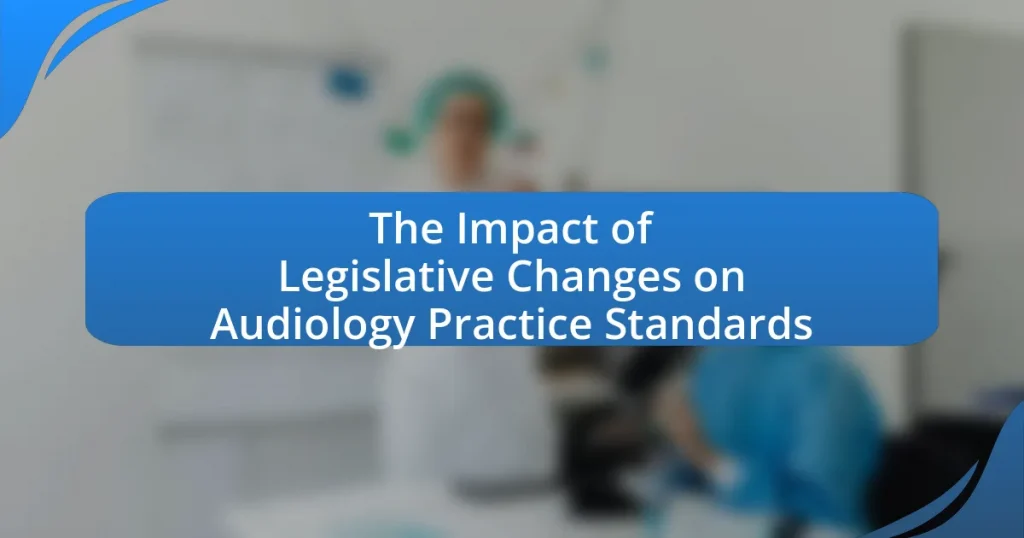The article examines the impact of legislative changes on audiology practice standards, highlighting key areas such as licensure requirements, scope of practice, and reimbursement policies. It discusses specific laws that influence audiology, including the Over-the-Counter Hearing Aid Act and the Affordable Care Act, which have expanded access to services and altered the delivery of care. Additionally, the article addresses the challenges audiologists face in adapting to these changes, the importance of compliance with updated regulations, and the resources available for professionals to navigate the evolving landscape of audiology practice. Overall, the legislative shifts are shown to enhance patient care and shape the operational framework within which audiologists operate.

What are the Legislative Changes Affecting Audiology Practice Standards?
Legislative changes affecting audiology practice standards include the implementation of new licensure requirements, updates to scope of practice regulations, and changes in reimbursement policies. For instance, many states have adopted laws that require audiologists to hold a doctoral degree, aligning with the standards set by the American Speech-Language-Hearing Association. Additionally, revisions in scope of practice have expanded the roles of audiologists in areas such as hearing aid dispensing and telehealth services. Furthermore, changes in reimbursement policies, particularly those related to Medicare and Medicaid, have influenced how audiologists are compensated for their services, emphasizing the need for compliance with evolving federal and state regulations. These legislative changes are crucial for ensuring that audiology practices meet contemporary healthcare standards and address the needs of patients effectively.
How have recent legislative changes influenced audiology practices?
Recent legislative changes have significantly influenced audiology practices by expanding the scope of practice and enhancing access to services. For instance, the Over-the-Counter Hearing Aid Act of 2017 allowed consumers to purchase hearing aids without a prescription, which has increased the availability of hearing devices and encouraged audiologists to adapt their services to include counseling and fitting for these devices. Additionally, changes in reimbursement policies under Medicare have incentivized audiologists to provide more comprehensive care, including telehealth services, which have become essential during the COVID-19 pandemic. These legislative shifts reflect a broader trend towards patient-centered care and increased accessibility in audiology.
What specific laws have been enacted that impact audiology standards?
The specific laws that have been enacted to impact audiology standards include the Individuals with Disabilities Education Act (IDEA), the Americans with Disabilities Act (ADA), and the Affordable Care Act (ACA). IDEA mandates that audiologists provide services to children with hearing impairments in educational settings, ensuring access to necessary support. The ADA prohibits discrimination against individuals with disabilities, which includes access to audiological services. The ACA expanded insurance coverage for hearing aids and audiology services, thereby increasing access to care. These laws collectively shape the practice standards and accessibility of audiology services in the United States.
How do these laws vary by region or country?
Laws governing audiology practice standards vary significantly by region and country, reflecting differences in healthcare systems, regulatory frameworks, and professional requirements. For instance, in the United States, each state has its own licensure requirements and scope of practice regulations for audiologists, which can lead to variations in the qualifications needed to practice. In contrast, countries like Canada have more standardized national regulations, although provinces may still impose specific requirements. Additionally, European countries often follow directives from the European Union, which can harmonize certain aspects of practice but still allow for national variations in implementation. These differences can impact the quality of care and accessibility of audiology services, as evidenced by studies showing that regulatory environments influence the availability of audiologists and the types of services offered.
Why are legislative changes important for audiology professionals?
Legislative changes are important for audiology professionals because they directly influence practice standards, scope of practice, and reimbursement policies. These changes can enhance the quality of care provided to patients by ensuring that audiologists are equipped with the latest evidence-based practices and technologies. For instance, the introduction of new laws can expand the ability of audiologists to diagnose and treat hearing disorders, which is crucial given that approximately 48 million Americans experience some degree of hearing loss, according to the National Institute on Deafness and Other Communication Disorders. Additionally, legislative updates can impact funding for audiology services, thereby affecting access to care for patients.
What risks do audiologists face without updated practice standards?
Audiologists face significant risks without updated practice standards, including potential legal liabilities, compromised patient safety, and diminished professional credibility. Legal liabilities arise from outdated practices that may not comply with current regulations, leading to malpractice claims. Compromised patient safety can occur when audiologists rely on obsolete techniques or technologies, which may result in misdiagnosis or ineffective treatment. Additionally, diminished professional credibility can stem from a failure to adhere to evolving standards, causing a loss of trust among patients and peers. These risks highlight the necessity for audiologists to stay informed and adapt to legislative changes that impact their practice standards.
How do legislative changes enhance patient care in audiology?
Legislative changes enhance patient care in audiology by establishing updated standards and regulations that ensure quality and accessibility of services. For instance, the introduction of the Affordable Care Act expanded insurance coverage for hearing aids and audiology services, allowing more patients to receive necessary care. Additionally, legislation such as the Hearing Aid Act mandates that audiologists provide comprehensive evaluations and informed consent, which improves patient outcomes by ensuring that individuals receive appropriate treatment tailored to their needs. These changes collectively promote better access to care, improved service quality, and enhanced patient safety in audiology practices.

What are the Key Areas of Audiology Practice Affected by Legislation?
Key areas of audiology practice affected by legislation include scope of practice, licensure requirements, reimbursement policies, and patient privacy regulations. Legislation defines the scope of practice by outlining the specific services audiologists are authorized to provide, ensuring that practitioners operate within legal boundaries. Licensure requirements establish the qualifications necessary for audiologists to practice, which can vary by state and impact workforce availability. Reimbursement policies, influenced by legislation, determine how audiology services are funded through insurance, affecting access to care for patients. Additionally, patient privacy regulations, such as those outlined in the Health Insurance Portability and Accountability Act (HIPAA), govern how audiologists handle patient information, ensuring confidentiality and security in practice.
Which aspects of audiology are most impacted by legislative changes?
Legislative changes most significantly impact audiology practice standards, including scope of practice, reimbursement policies, and licensure requirements. These changes can redefine what audiologists are legally permitted to do, affecting their ability to provide services such as hearing assessments and fitting hearing aids. For instance, the introduction of the Affordable Care Act expanded insurance coverage for audiology services, thereby influencing reimbursement rates and access to care. Additionally, state-level legislative changes can alter licensure requirements, impacting the qualifications needed to practice audiology in different regions.
How do changes in licensing requirements affect audiologists?
Changes in licensing requirements directly impact audiologists by altering their ability to practice legally and effectively. When new regulations are introduced, audiologists may need to undergo additional training or certification processes to meet the updated standards, which can lead to increased costs and time commitments. For instance, a study by the American Speech-Language-Hearing Association in 2021 highlighted that states implementing stricter continuing education requirements saw a 15% increase in compliance costs for audiologists. Additionally, changes can affect job availability, as stricter licensing may limit the number of practitioners eligible to work in certain regions, thereby influencing patient access to audiological services.
What role do insurance regulations play in audiology practice standards?
Insurance regulations significantly influence audiology practice standards by establishing the parameters for reimbursement and service delivery. These regulations dictate which audiological services are covered, thereby shaping the scope of practice for audiologists. For instance, regulations may require audiologists to adhere to specific clinical guidelines and documentation standards to qualify for reimbursement, ensuring that practices meet established quality benchmarks. Furthermore, compliance with insurance regulations can affect the accessibility of audiological services for patients, as coverage limitations may restrict the types of services that can be provided. This interplay between insurance regulations and practice standards ultimately impacts the quality of care delivered in the field of audiology.
How do legislative changes affect audiology education and training?
Legislative changes significantly impact audiology education and training by altering the requirements for licensure and certification. For instance, when states update their laws to mandate a Doctor of Audiology (Au.D.) degree for practice, educational institutions must adapt their curricula to meet these new standards, ensuring that graduates are adequately prepared for licensure. Additionally, changes in federal regulations, such as those related to Medicare reimbursement, can influence the focus of training programs, prompting them to emphasize skills that align with new service delivery models. These adjustments ensure that audiology professionals are equipped with the necessary knowledge and competencies to comply with evolving legal and professional standards.
What new competencies are required for audiologists due to these changes?
Audiologists now require competencies in telehealth practices, advanced technology integration, and knowledge of evolving legislative frameworks. The shift towards telehealth necessitates skills in virtual patient assessments and remote monitoring, as evidenced by the increase in telehealth services during the COVID-19 pandemic, which saw a 154% increase in telehealth visits among Medicare beneficiaries. Additionally, audiologists must be adept at using digital tools and software for hearing aid fittings and patient management, reflecting the industry’s technological advancements. Understanding legislative changes, such as those related to insurance coverage and patient rights, is crucial for compliance and advocacy, ensuring audiologists can navigate the complexities of new regulations effectively.
How are educational institutions adapting to legislative updates?
Educational institutions are adapting to legislative updates by revising their curricula and training programs to align with new regulations and standards. For instance, many audiology programs are incorporating updated clinical practices and ethical guidelines that reflect recent legislative changes, ensuring that graduates are well-prepared for compliance in their professional roles. This adaptation is evidenced by the Council on Academic Accreditation in Audiology and Speech-Language Pathology, which mandates that accredited programs regularly review and update their educational content to meet evolving legislative requirements.

What are the Implications of Legislative Changes for Audiology Practice?
Legislative changes significantly impact audiology practice by altering regulatory frameworks, scope of practice, and reimbursement policies. These changes can lead to expanded roles for audiologists, such as the ability to provide direct access to services without physician referrals, which enhances patient care and accessibility. For instance, the American Speech-Language-Hearing Association reported that states adopting direct access laws have seen increased patient engagement and satisfaction. Additionally, legislative updates can influence funding for hearing healthcare services, affecting the availability of resources for audiologists and their patients. Overall, legislative changes shape the operational landscape of audiology, necessitating ongoing adaptation by practitioners to comply with new standards and optimize service delivery.
How do legislative changes impact the delivery of audiology services?
Legislative changes significantly impact the delivery of audiology services by altering regulations that govern practice standards, reimbursement policies, and scope of practice. For instance, the introduction of the Affordable Care Act expanded access to audiology services by mandating coverage for hearing aids and related services under certain insurance plans, thereby increasing the number of patients who can receive care. Additionally, changes in licensure requirements can either facilitate or restrict the ability of audiologists to practice, directly affecting service availability. Research indicates that states with more favorable legislative environments for audiology see higher rates of service utilization, demonstrating a clear link between legislation and service delivery outcomes.
What challenges do audiologists face in adapting to new standards?
Audiologists face several challenges in adapting to new standards, primarily due to the rapid pace of legislative changes and the need for ongoing education. These professionals must stay informed about evolving regulations, which can vary significantly by region and impact clinical practices. Additionally, the integration of new technologies and treatment protocols requires audiologists to undergo continuous training, which can be time-consuming and costly. Furthermore, the financial burden of updating equipment and ensuring compliance with new standards can strain resources, particularly for smaller practices. These challenges highlight the necessity for audiologists to be proactive in their professional development and resource management to effectively navigate the changing landscape of audiology practice standards.
How can audiologists ensure compliance with updated regulations?
Audiologists can ensure compliance with updated regulations by regularly reviewing and integrating the latest legislative changes into their practice protocols. This involves staying informed through professional organizations, attending relevant training sessions, and subscribing to industry publications that outline new regulations. For instance, the American Speech-Language-Hearing Association (ASHA) provides resources and updates on regulatory changes that affect audiology practices. By actively participating in continuing education and utilizing available resources, audiologists can adapt their practices to meet compliance standards effectively.
What best practices should audiologists adopt in light of legislative changes?
Audiologists should adopt best practices that include staying informed about legislative changes, ensuring compliance with new regulations, and enhancing patient education. Staying informed allows audiologists to understand the implications of laws such as the Over-the-Counter Hearing Aid Act, which impacts how hearing aids are marketed and sold. Compliance with regulations ensures that audiologists maintain licensure and uphold standards of care, which is critical for patient safety and trust. Enhancing patient education about their rights and available services fosters informed decision-making and improves patient outcomes. These practices are essential for adapting to the evolving landscape of audiology influenced by legislative changes.
How can audiologists stay informed about ongoing legislative developments?
Audiologists can stay informed about ongoing legislative developments by subscribing to professional organizations and advocacy groups that focus on audiology, such as the American Speech-Language-Hearing Association (ASHA) and the Academy of Doctors of Audiology (ADA). These organizations provide regular updates, newsletters, and alerts regarding changes in legislation that affect audiology practice. Additionally, audiologists can participate in webinars, attend conferences, and engage in continuing education courses that often cover relevant legislative topics. Research indicates that active involvement in these professional networks enhances awareness of legislative changes, thereby enabling audiologists to adapt their practices accordingly.
What resources are available for audiologists to navigate these changes?
Audiologists can access several resources to navigate legislative changes impacting their practice standards. Professional organizations such as the American Speech-Language-Hearing Association (ASHA) and the Academy of Doctors of Audiology (ADA) provide guidelines, updates, and continuing education opportunities tailored to new regulations. Additionally, state licensing boards offer specific information regarding compliance and practice requirements. Research publications and webinars from these organizations also serve as valuable tools for understanding the implications of legislative changes on clinical practice.


